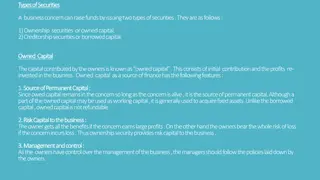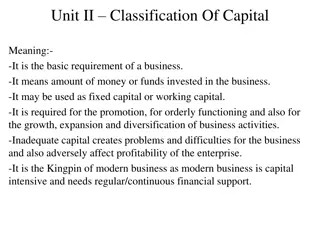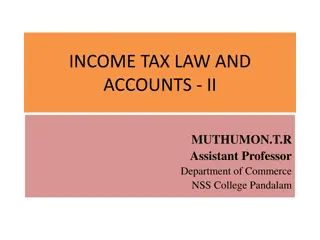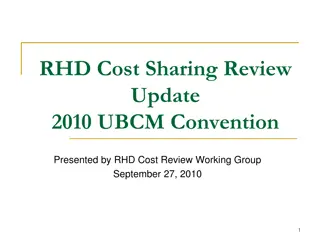
Understanding Share Capital in Company Finance
Share capital is essential for a company's financial activities, synonymous with company capital. Learn about the different meanings of capital such as nominal, issued, paid-up, and more. Explore classes of capital, alteration of capital, and the importance of share capital in business operations.
Download Presentation

Please find below an Image/Link to download the presentation.
The content on the website is provided AS IS for your information and personal use only. It may not be sold, licensed, or shared on other websites without obtaining consent from the author. If you encounter any issues during the download, it is possible that the publisher has removed the file from their server.
You are allowed to download the files provided on this website for personal or commercial use, subject to the condition that they are used lawfully. All files are the property of their respective owners.
The content on the website is provided AS IS for your information and personal use only. It may not be sold, licensed, or shared on other websites without obtaining consent from the author.
E N D
Presentation Transcript
SHARE CAPITAL Deptt. of Commerce Government College, Dera Bassi
INTRODUCTION & MEANING A company needs to have capital for its financial activities. In the case of company capital and share capital are synonymous words. Share capital means the capital raised by a company by the issue of shares. Share capital raised at the time of formation of company for starting business operations or further expansion of the business. Share capital becomes a permanent liability of the company. The word capital has several different meanings. It may mean the nominal, issued, paid up or reserved share capital.
DIFFERENT MEANINGS OF CAPITAL NOMINAL CAPITAL The nominal, registered or authorized capital is the amount of share capital which a company is authorized to issue. Nominal capital is divided into shares of a fixed amount. The amount of a company s nominal capital depends on the business requirements. ISSUED CAPITAL It is that part of nominal capital which is actually issued by the company for public subscription. A company can t issue all its nominal capital at once. The difference between nominal and issued capital is known as unissued capital. SUBSCRIBED CAPITAL It is the total amount of the nominal value of shares which have been actually taken up, i.e., subscribed for by the public.
DIFFERENT MEANINGS OF CAPITAL CALLED-UP CAPITAL According to section 2(15) of the Companies Act,2013, called up capital means such part of the capital, which has been called for payment. PAID-UP CAPITAL The paid up capital is that part of the issued capital which has been paid up by the shareholders. UNCALLED CAPITAL This is the amount which remains uncalled on shares. When shares are fully paid there is no uncalled capital. RESERVE CAPITAL A company may resolve by special resolution that part other whole of the uncalled capital shall not be called upon except in the event of winding up. This amount is called the reserve capital or the reserve liability according to section 99 of the Companies Act, 2013.
CLASSES OF CAPITAL Section 43 as amended by the Companies Amendment Act,2000 provided that the share capital of a company limited by shares shall be of two types: PREFERENCE SHARE CAPITAL Ii is the sum total of preference shares. These shares carry the following preferential rights over equity shares. As regards dividends, to be paid a fixed amount calculated at a fixed rate; On winding up of the company, repayment of capital paid up.{Section 43} EQUITY SHARE CAPITAL It means all the share capital which is not preference share capital. In the absence of equity share capital, there cannot be preference share capital. A private company may issue share capital of such other kinds as it may think fit. i. ii.
ALTERATION OF CAPITAL Under section 61 a company limited by shares may in general meetings, if so authorized by its articles, alter the conditions of its memorandum relating to share capital in order to: Divide all or any of its share capital into shares of larger amount than its existing shares. Increase its share capital by issuing new shares; Convert all or any of its fully paid up shares into stock and reconvert that stock into fully paid-up shares; Sub-divide its share into smaller amount than is fixed by the memorandum. Within 30 days of passing the resolution for alteration of share capital, notice must given to the registrar who make necessary changes in the memorandum and articles. On failure to give notice every person in default shall liable to a fine which may extent up to one thousand rupees for every day during which the default continues or rupees five lakh which is ever less. a) b) c) d)
REDUCTION OF CAPITAL {SECTION 66} Reduction of capital means reduction of issued, subscribed and paid up capital of a company. The capital of a company cannot be reduced unless all the formalities as laid down in section 66 of the Companies Act are complied with. A company may wish to reduce its capital for a number of reasons, namely- The capital of the company may be more than enough for its needs, and so, it may return the surplus capital to the shareholders. The paid-up capital of a company is sufficient and it may refrain from calling up the unpaid portion of share money. Some of the capital may in fact have been lost or diminished e.g., share of rupees 100 may represent assets worth rupees 50. The company may wish to write off the lost capital. 1. 2. 3.
WAYS OF REDUCTION OF CAPITAL Reduction of capital may be effected in several ways which may be classified under two heads: REDUCTION WITHOUT THE CONSENT OF THE TRIBUNAL There are a number cases where a company may reduce its capital without the sanction of the tribunal. Where redeemable preference shareholders are redeemed in accordance with the provisions of Section 55. Where unissued shares are cancelled. Where any shares are forfeited for non-payment of calls. The company may purchase its own shares under section 68 of the Companies Act. In all these cases the procedure are laid down under Section 66 of the Companies Act is not required to be followed. a) b) c) d)
WAYS OF REDUCTION OF CAPITAL REDUCTION WITH THE CONSENT OF THE TRIBUNAL Section 66 gives a company limited by shares or a company limited by guarantee and having a share capital the power to reduce its share capital in any way. The Act has not prescribed the manner in which the reduction is to be carried out, nor prohibited any method of effecting that object. The reduction of capital can only be made: By passing special resolution, Which is confirmed by the Tribunal. i. ii.
PROCEDURE FOR REDUCTION OF CAPITAL(SEC. 66) The procedure for reducing the share capital of a company is as follow: SPECIAL RESOLUTION A company shall pass a special resolution for reduction of share capital.[Section 66(1)] A company cannot reduce its capital if the company is in arrears in the repayment of any deposits , then first of all articles must be altered so as to give the power and then the resolution for reducing the capital must be passed. APPLICATION TO THE TRIBUNAL After having passed special resolution for reducing share capital, sanction of the National Company Law Tribunal shall be obtained by the company for an order confirming the reduction.[Section 66(1)] The Tribunal shall give notice of every application made to it to the Central Govt., Registrar and to the Securities and Exchange Board.
PROCEDURE FOR REDUCTION OF CAPITAL REGISTRATION OF THE ORDER OF TRIBUNAL WITH REGISTRAR The company shall deliver to the Registrar a certified copy of the Tribunal order and a minute approved by the Tribunal showing the following details for registration- The amount of share capital; The number of shares into which it is to be divided; The amount of each share; and The amount, if any, at the date of registration deemed to paid-up on each share. The Registrar will register the order and a minute. On such registration, the resolution for reducing the capital takes effect. Notice of registration shall be published in such manner as may be directed by the Tribunal. The registrar shall certify the registration of the order and the minute under his hand. The reduction takes effect as from the date of registration by the Registrar. Then alteration shall be noted on every copy of the memorandum of association issued after the date of registration. a) b) c) d)
FURTHER ISSUE OF CAPITAL A company may increase its capital- By allotment of new shares. By conversion of debentures or loans into shares. ALLOTMENT OF FURTHER SHARES[Section 62] A company may desire to expand its activities or it may stand in need of more capital even in the absence of expansion of activities. If the directors or the majority shareholders are allowed to distribute the issue at their discretions, they may offer it to their nominees, thus, adding to their own majority and reducing the strength of the minority. Under this section shares cannot issued to public before offered to the shareholders this is known as shareholders right of pre emption. 1. 2.
FURTHER ISSUE OF CAPITAL Steps for issue of further shares: NOTICE OF OFFER The offer to the existing shareholders must be made by notice specifying the number of shares offered and the time within it should be accepted. Such time should be less then 15 days and not exceeding 30 days. If the offer is not accepted within the prescribed period, it shall be deemed to have been declined.[Section 62(1)(a)]. NOTICE TO CONTAIN RIGHT OF RENUNCIATION The notice shall also inform the shareholders that the offeree may renounce the whole or part of the offer in favour of any other person unless the articles otherwise provide[Sec 62 (1)(a)].
FURTHER ISSUE OF CAPITAL EXCEPTIONS I the following cases, a company need not offer further issue of shares to the existing shareholders: 1) Where a special resolution is passed to that by the company in general meetings. 2) Where no such special resolution is passed, if the company at the general meeting passes an ordinary resolution to that effect and the approval of the Central Govt. is obtained. The Central Govt. will accord the approval if it is satisfied on an application by the Board of Directors that the proposal is most beneficial to the company. 3) If any shareholder to whom the shares are offered declines to accept the shares or does not apply within the period specified in the notice. 4) A private company need not offer its further issue to existing shareholders. 5) An allotment of shares on conversion of debentures of loans into shares, or creditors subscribing for shares in terms of the loan raised.
FURTHER ISSUE OF CAPITAL ISSUE OF SHARES IN CONTRAVENTION OF SECTION 62 The allotment of shares made contrary to the provisions section 81 is not invalid, rather is voidable at the option of the director or a shareholder who is aggrieved by such an allotment. Such an allotment may be used as a weapon of defence when any right or liability arising out of such allotment is sought to be enforced. CONVERSION OF DEBENTURES OR LOANS INTO SHARES A company may issue share to its lenders or debenture holders who have been given the option to convert their loans or debentures into shares. However, the company can do so only if such conversion has been approved before the issue of debentures or raising the loans by a special resolution.
FURTHER ISSUE OF CAPITAL NOTICE OF INCREASE OF SHARE CAPITAL OR OF MEMBERS[Section 64] A company having a share capital shall within thirty days of the resolution authorising the increase of capital give notice to the Registrar. The Registrar shall upon receipt of the notice record the increase and also make any alteration which may be necessary in the company s memorandum or articles or both. If default is made in complying with these provisions, the company and every officer of the company who is in default, shall be punishable with fine which may extend to rupees 1,000 for every day during which the default continues or rupees 5 lakhs which ever is less.
VOTING RIGHTS The voting rights are governed by the provisions of section 47 of the Companies Act. Every member of a company is entitled to vote and when he exercises his right to vote, he is exercising a right of property. EQUITY SHAREHOLDER S RIGHTS According to section 47(1) of the 2013 Act: Every member of a company limited by shares and holding equity share capital therein, shall have a right to vote on every resolution placed before the company. His voting right on a poll shall be in proportion to his share in the paid-up equity share capital of a company. a) b)
VOTING RIGHTS PREFERENCE SHAREHOLDER S RIGHTS Every holder of the preference share capital shall have been in respect of such capital, a right to vote only on resolutions which directly affect rights attached to the preference shares. A resolution for winding up or repayment or reduction of share capital shall be deemed to be one affecting directly the rights of preference shareholders. The preference shareholders shall have a right to vote on every resolution placed before the meeting where such dividend has remained unpaid for an aggregate period of not less than two years before the date of the meeting. T he voting rights of each holder of preference shares of either class will be in proportion in which the capital paid-up on his shares bears to the total equity capital of the company.
VOTING RIGHTS VARIATION OF SHAREHOLDERS RIGHTS[Section 48] The rights of the holders of a class of shares may be varied with the written consent of the holders of at least three fourths of the issued shares of that class. Such rights can also be varied by a special resolution passed at a separate meeting of such shareholders provided that- The memorandum or articles provide for such variation; and Where there is no such provision, such variation is not prohibited by the terms of issue of the share or the class of shares.[Section 48]. The variation referred to in section 106 is variation to the prejudice of any class of shareholders and not variation adding to or enhancing the rights of any class. a. b.
VOTING RIGHTS RIGHTS OF DISSENTING SHAREHOLDERS Where the rights of a class of shareholders are varied, the holders of not less than 10 per cent of the issued shares of that affected class, may apply to Tribunal to have the variation cancelled provided they did not consent or vote for the variation. The application must be made within 21 days after the giving of the consent or passing the resolution. The company must send a copy of the Tribunal order within 30 days to the Registrar. if any default is made in complying with the provisions of this section, the company and every officer of the company who is in default shall be punishable with imprisonment for a term which may extent to six months or with fine which shall not be less than twenty- five thousand rupees but which may extend to five lakh rupees, or with both.[Section 48(5)]
SEBI GUIDELINES REGARDING RIGHTS ISSUES APPLICABILITY These guide lines apply to the rights issues made by existing listed companies(the companies whose equity capitals listed) These fore a company whose debentures/bonds are listed but not the equity(i.e. shares) will not be governed by those guidelines. These guidelines are not applicable where the size of the issue is up to rupees 50 lakhs. WITHDRAWL OF A RIGHTS ISSUE Rights issue cannot be withdrawn after the announcement of the record date. If done, then no security of the company shall be eligible for listing up to 12 months.
SEBI GUIDELINES REGARDING RIGHTS ISSUES UNDERWRITING The underwriting of rights issue shall be optional. APPOINTMENT OF REGISTRAR Appointment of Registrars to issue shall b e compulsory. APPOINTMENT OF MERCHANT BANKER Appointment of Category-1 Merchant Banker holding a valid certificate of registration issued by SEBI shall be compulsory. PARTLY PAID SHARES Partly paid shares, if any, must either be made fully paid or forfeited.
SEBI GUIDLIINES REGARDING RIGHTS ISSUES LETTER OF OFFER Letter of offer shall contain disclosures specified by SEBI (See section iii of SEBI guidelines relating to contents of offer document. The Lead Merchant Banker shall: Ensure compliance of the requirements of SEBI guidelines with respect to the offer document relating to rights issues. File with SEBI a copy of the offer document at least 21 days before filing of the same with the Regional Stock Exchange. AGREEMENT WITH DEPOSITORY The company shall enter into an agreement with the depository for dematerialization: Of securities already issued; Proposed to be issued; The subscribers/shareholders must be given an option of holding the shares in a dematerialization mode or by way of share certificates. i. ii. i. ii. iii.
SEBI GUIDELINES REGARDING RIGHTS ISSUED NO COMPLAINTS CERTIFICATE After a period of 21 days from the date the draft offer document was made public, the Lead Merchant Banker shall file a statement with SEBI: Giving a list of complaints received by it. A statement by it whether it is proposed to amend the draft offer document or not; and Highlight of those amendments. COMPLIANCE REPORT The post-issue Lead Merchant Banker shall file. 3 days Post Issue Monitoring Report : The report shall be filed on the 3rd day from the date of closure of the subscription of the issue. 50-days Post-Issue Monitoring Report : This report shall be filed on the 50th day from the date of closing of subscription of the issue. a. b. c. a. b.






















